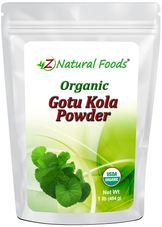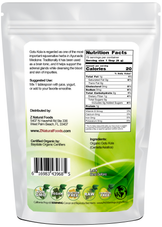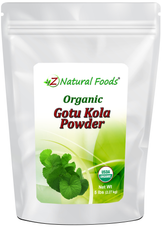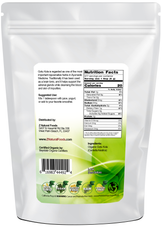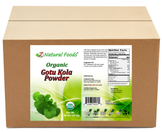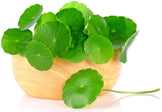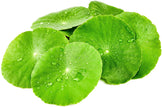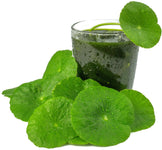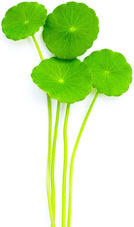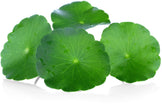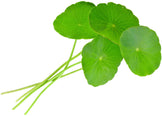Description
Description
Z Natural Foods is committed to sourcing ingredients with deep historical roots and modern-day relevance. One such botanical is Gotu Kola (Centella asiatica)—a celebrated plant across the traditions of Ayurveda, Traditional Chinese Medicine (TCM), and Western herbalism.
Our Organic Gotu Kola Powder is crafted from pure, organic leaves and offers a versatile way to connect with a timeless herbal ally.
Is This Time-Honored Traditional Tonic Herb for Mind and Body all it's cracked up to be?
While gotu kola is available in various forms—extracts, teas, capsules—many herbalists and practitioners still revere the whole leaf powder for its subtle complexity, energetic properties, and long-term suitability.
Let’s explore why this unique herb continues to hold global significance, supported by both ancient wisdom and modern research.
An Herb Woven into Global Healing Traditions
🌿 Ayurveda: The “Pharmacy in One Herb”
Before we discuss the value of gotu kola in Ayurvedic medicine, here is a quick review of its basic foundational principles.
Ayurvedic medicine works on three primary doshas (Vata, Pitta, and Kapha), comprising elements (water, earth, air, fire, and ether). Doshas are believed to be the energy that circulates in the body and governs physiological activity.
-
Vata is the movement of blood, oxygen, and neurotransmitters. It governs the movement of thoughts, emotions, and bodily functions.
-
Pitta comprises fire and water elements. It governs metabolism, transforming food into energy. Pitta is the fire that deals with physical digestion and mentally digesting life experiences.
-
Kapha: The structure of grounding and stability governing nourishment and growth. It governs stability, strength, and lubrication in the body. It is important to note that excess Kapha can lead to lethargy, weight gain, and congestion.
“One of the unique principles of Ayurveda is the understanding of health as a result of the coordinated functioning of the soul, mind, and body in an intimate relationship with everything else in the cosmos- material and nonmaterial. It believes the constituent factors of the human body and the cosmos are the same.”
In Ayurvedic medicine, Gotu Kola is classified as a rasayana, a rejuvenating tonic traditionally used to promote longevity, inner clarity, and balanced vitality. Some of its most commonly reported benefits are the following:
-
Brain tonic (supports blood flow to the brain, feet, and hands)
-
Skin condition disorders (red, inflamed skin)
-
Antioxidant
-
Diuretic
-
Systemic anti-inflammatory
-
Anti-bacterial
Often referred to as Brahmi in parts of India, gotu kola is known for its ability to balance the Pitta and Kapha doshas, with qualities that are light, bitter, and cooling in nature.
Traditional Ayurvedic texts emphasize its use to support healthy energy flow through the body, known as prana, and its association with sattva, the quality of purity and harmony. Yogis have long consumed gotu kola tea before meditation, citing improved awareness and emotional steadiness. The leaf's resemblance to the cerebellum has further cemented its symbolic and energetic association with the mind.
Ayurvedic Attributes of Gotu Kola:
-
Rasa (Taste): Bitter
-
Guna (Quality): Light
-
Virya (Potency): Cooling
-
Vipaka (Post-digestive effect): Sweet
-
Tridoshic effect (The influence of movement, transformation, and sensory functions): Balances Pitta and Kapha
🧧 Traditional Chinese Medicine: A Cooling Herb for Heat and Vitality
Next, let's dig into some of the fundamental principles that define Traditional Chinese Medicine (TCM). Traditional Chinese Medicine (TCM) believes in the following:
-
All foods and herbs have energy.
-
All foods and herbs have Yin/ Yang energy.
-
All foods and herbs have five temperatures (cold, cool, neutral, warm, hot)
-
All food and herbs have five flavors (pungent, sour, sweet, bitter, salty)
-
All foods and herbs have four directions (ascending, descending, floating, sinking).
Within these principles, Yin and Yang's action is the general property, and temperature is the extremeness of the properties. In simple terms, Yin is cooling, builds blood, and has downward-moving energy. Yang is warming, energizing, and has upward-moving energy. Because Yang is the heating element, and Yin is the cooling element, those with too much heat are said to have a Yang excess, causing a Yin deficiency.
One of the primary theories of TCM is the five phases. It states that the ingredient's taste is a key to determining its action in the body.
-
Pungent ingredients often promote the circulation of Qi and body fluids.
-
Bitter foods like gotu kola frequently have clearing and drying actions that promote elimination through the urine and bowels.
The five-phase theory also connects taste with the organs and meridians it targets. Gotu kola is believed to target:
-
The spleen, according to TCM, assists in digestion and fluid metabolism.
-
According to TCM, the kidneys regulate the urinary and reproductive systems and store Jing, the life essence.
-
According to TCM, the liver regulates Qi and body fluids and plays a leading role in balancing emotions.
Inflammation and infectious conditions in Traditional Chinese Medicine (TCM) are known as internal heat. When an individual suffers from such conditions, it is believed to result from a Yin (cold) deficiency or an excess of Yang (heat). Gotu Kola’s ability to disperse damp-heat and reduce swelling makes it a perfect choice for these types of conditions. Therefore, some conditions or symptoms for which a TCM practitioner may suggest gout kola are heat stroke, boils, diarrhea, traumatic injuries, or any condition where the skin is red and inflamed.
Folklore from East Asia recounts the tale of an herbalist who lived to be 200 years old by consuming gotu kola daily—earning it nicknames like the “fountain of life” and “miracle elixir.”
🌿 Western Herbalism: A Cognitive Ally and Nervine Tonic
The general term used to describe “brain tonics” is nervines. A nervine is a nerve tonic that mildly relaxes without the strong suppressive effects of a sedative.
Nervines restore emotional balance and nourish nerves and the nervous system. Some examples are skullcap, lemon balm, milky oats, and passionflower.
Much like Ayurvedic medicine, Western herbalism considers gotu kola a tremendous cerebral tonic known to potentially do the following:
-
Promote circulation
-
Inhibit neuroinflammatory responses
-
Support cognitive function and memory
-
Potentially relieve situational anxiety.
However, in Western herbal medicine, gotu kola is defined as a nootropic herb or “cognitive enhancer”.
Nootropics are a category of substances (both natural and synthetic)that show potential for improving cognitive function via relaxation, supporting a healthy mood, memory, attention, and creativity. The Romanian psychologist Corneliu Giurgea first defined the term Nootropic and was also the first to synthesize one of the most well-known substances in this general category, Piracetam, in 1964. The Giurgea Nootropic Criteria states that for any substance to be considered a nootropic, it must do the following:
-
Enhance learning and memory.
-
Enhance the resistance of learned behaviors/memories to conditions that disrupt them.
-
Protect the brain against a broad spectrum of physical or chemical injuries.
-
Increase our ability to focus and pay attention
-
Lack of common side effects that are related to other psychotropic drugs
-
Be non-toxic at clinical dosages
Keep in mind that many herbs directly affect the nervous system, like sedatives (hops), anxiolytics (valerian, kava), antispasmodics (vervain, kava), analgesics (California poppy), and nervines (milky wild oat, passionflower). These herbs are often miscategorized as nootropics.
While the above herbs have specific nootropic-like attributes, they don’t fulfill the criteria to be considered actual nootropics. However, it is exciting to know that nootropics do support many of these particular actions. Nootropics in traditional systems of medicine are not often used as individual entities. They are usually combined with supportive herbs like adaptogens and nervines to support and balance their effects.
With adaptogens, HPA axis and SAS restorative benefits on the immune, endocrine, and nervous systems, and nervines calming and emotionally balancing effects, these three categories of herbs are a match made in heaven.
Scientific Interest in Gotu Kola
The following was stated in a double-blind, placebo-controlled study on the effects of Gotu Kola (Centella asiatica) on acoustic startle response in healthy subjects.
-
Subjects were randomly assigned to receive either a single 12-g orally administered dose of Gotu Kola (N = 20) or placebo (N = 20).
-
The results revealed that compared with placebo, Gotu Kola significantly attenuated the peak ASR amplitude 30 and 60 minutes after treatment.
-
However, Gotu Kola had no significant effect on self-rated mood, heart rate, or blood pressure.
These preliminary findings suggest that Gotu Kola has anxiolytic activity in humans as revealed by the ASR.
The following was stated in another study looking at the positive modulation of cognition and mood in healthy elderly volunteers following the administration of Centella asiatica.
-
Twenty-eight healthy elderly participants received the plant extract at various doses ranging from 250, 500, and 750 mg once daily for 2 months.
-
Cognitive performance and event-related potential were assessed using the computerized test battery.
-
In contrast, mood was assessed using Bond-Lader visual analogue scales before the trial and after single, 1, and 2 months after treatment.
-
Results showed that the high dose of the plant extract enhanced working memory and increased the N100 component amplitude of event-related potential.
-
Improvements in self-rated mood were also found following the Centella asiatica treatment.
Therefore, it was concluded that “the present findings suggest the potential of Centella asiatica to attenuate the age-related decline in cognitive function and mood disorder in the healthy elderly.”
In conclusion, gotu kola has a rich and strong history across many forms of traditional medicine backed by solid research. Western, Ayurvedic, and TCM all understand and revere gotu kola's powerful tonic value. When applied to the proper situations and used appropriately (as a tonic), gotu kola can provide profound, long-term, sustainable results.
So, is this powerful tonic all it's cracked up to be?
The answer is…. YES.
For more information about our Organic Gotu Kola Powder, go here:
To review all of our Vegetable, Leaf & Grass Powders, go here:
Vegetable, Leaf & Grass Powders Collection



